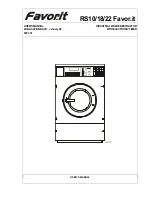
96-610 • LANDA VNG/VLP • REV. 9/05
OPERA
T
OR’S MANU
AL
PRESSURE W
ASHER
8
INSTALLATION
Place machine in a convenient location providing ample
support, drainage and room for maintenance.
Location:
This machine is certified for indoor installation. Its
location should protect the machine from damag-
ing environmental conditions, such as wind, rain
and freezing.
1. The machine should be run on a level surface
where it is not readily influenced by outside sources
such as strong winds, freezing temperatures, rain,
etc. The machine should be located considering
accessibility of the components and the refilling of
detergents, adjustments and maintenance. Normal
precautions should be taken by operator of ma-
chine to prevent excess moisture from reaching
power machine or electrical controls.
2. It is recommended that a partition be made be-
tween wash area and machine to prevent direct
spray from spray gun from coming in contact with
machine. Excess moisture reaching pressure
washer or electrical controls will reduce life of ma-
chine and may cause electrical shorts.
3. During installation of machine, beware of poorly
ventilated locations or areas where exhaust fans
may cause an insufficient supply of oxygen. Suffi-
cient combustion can only be obtained when a suf-
ficient supply of oxygen is available for the amount
of fuel being burned. If it is necessary to install a
machine in a poorly ventilated area, outside fresh
air may have to be piped to burner and a fan in-
stalled to bring air into area.
4. Do not locate near any combustible material. Keep
all flammable material at least 20 feet away.
Allow enough space for servicing the machine.
Local code will require certain distances from floor
and walls. (Two feet away should be adequate.)
AVOID SMALL LOCATIONS OR AREAS NEAR
EXHAUST FANS.
Gas Codes:
Confer with local gas company and with proper mu-
nicipal officials regarding any specific code or regula-
tions governing the installation. The installation must
conform to local codes.
Electrical:
The machine, when installed, must be electrically
grounded in accordance with local codes. Check for
proper power supply using a volt meter; check the se-
rial plate for the correct requirements.
Gas Piping:
All piping must comply with local codes and ordinances
of the National Fuel Gas Code. A sediment trap or drip
leg must be installed in the supply line to the burner.
See figure 1.
A union shall be installed in the gas line adjacent to
and upstream from the control manifold and down-
stream from the manual main shut-off valve.
A 1/8" N.P.T. plugged tapping accessible for test gauge
connection shall be installed immediately upstream of
the gas supply connection for the purpose of deter-
mining the gas supply pressure to the burner, and to
prevent damage to gas valve.
If a manual gas shut off valve is not in the gas supply
line within six feet of the machine and in an accessible
location, one shall be installed.
A manual shut-off valve shall be installed in the gas
supply line external to the appliance. See Figure 2. The
gas line should be a separate supply direct from the
meter to the burner. It is recommended that new pipe
be used and located so that a minimum amount of work
will be required in future servicing. The piping should
be installed to be durable, substantial and gas tight. It
should be clear and free from cutting burrs and defects
in structure of threading. Cast iron fittings or aluminum
tubing should not be used for the main gas circuit. Joint
compounds (pipe dope) should be used sparingly on
male threads only and be approved for all gases.
Figure 1: Drip Leg
3 in. (76.2
mm)
MINIMUM
3 in. (76.2 mm)
MINIMUM
Sediment trap (drip leg) must be
installed in the supply line.
Drop
Gas
Valve
Gas
Valve
1/4" Test Port
(6"-14 WC or 1/2"
PSIG)
Содержание VNG4-2000
Страница 2: ......
Страница 54: ......
Страница 56: ...Form 96 610 Revised 9 05 Printed in U S A WATER CLEANING SYSTEMS...









































